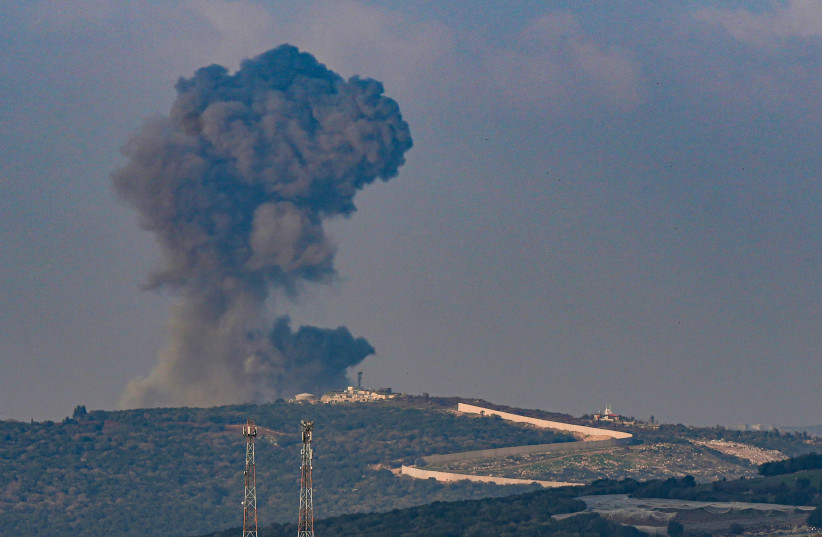Hezbollah Secretary-General Hassan Nasrallah hinted that Lebanon may use the rising tensions with Israel to try and gain the upper hand on territorial disputes along the Lebanese-Israeli border, as he continued to threaten further attacks in a speech on Friday afternoon.
"We are facing a real opportunity to liberate every inch of our Lebanese land and prevent the enemy from violating our borders and airspace," said Nasrallah.
Recent reports by Lebanese and Israeli media have pointed to efforts by foreign mediators to pressure Hezbollah into withdrawing from the border area in exchange for concessions concerning disputed points along the border, although these efforts have so far failed.
The disputed points were at the center of a spike in tensions starting at the beginning of this year, when Hezbollah organized riots along the border, set up tents staffed by armed terrorists inside Israeli territory in the Shebaa Farms, and either organized or facilitated a roadside bombing carried out by a Lebanese infiltrator near Megiddo.
Nasrallah addresses Israel
Nasrallah referred to the tents in his speech on Friday saying "The tent is a thing of the past. Today there is a real war on the borders." The tent was hit in an Israeli strike at the beginning of the war.
The Hezbollah leader also referenced the alleged Israeli assassination of deputy Hamas leader Saleh al-Arouri, warning that Hezbollah "cannot accept" such a strike.

"I tell you with certainty that this will not go without a response or punishment," said Nasrallah, adding that he would not say the phrase "in the appropriate time and place" and that instead the forces on the ground would be the ones to decide the response. Iran and its proxies often say they will respond "in the appropriate time and place" when they intend to push off any response to a specific issue to a later date, if ever.
"We cannot remain silent about a violation of this seriousness because this means that all of Lebanon, the cities, and the central figures will become exposed," added Nasrallah. "The magnitude of the harm resulting from remaining silent about this violation is greater than any risks that may come from responding. So the decision is up to the field."
Less than a day later, on Saturday morning, Hezbollah announced that it had conducted an "initial response" to Arouri's assassination, launching about 40 rockets toward the Meron area in northern Israel. The terrorist movement claimed it was targeting a base for the Israeli Air Force's 506th Regional Control Unit.
Nasrallah insisted in his speech that Hezbollah only attacked Israel in order to relieve pressure on the factions in Gaza. "The battle taking place in southern Lebanon has stabilized the balance of deterrence," said Nasrallah.
Arouri was killed in a drone strike blamed on Israel on Tuesday evening targeting an office belonging to Hamas in the southern suburbs of Beirut. Azzam al-Aqra and Samir Fendi, two commanders in Hamas' al-Qassam Brigades, were killed in the strike as well.
Israel has not officially taken responsibility for the strike, although several government officials have published social media posts welcoming Arouri's death.
The IDF spokesperson for Arabic media, Avichay Adraee, rejected Nasrallah's threats after the speech, writing on X that "Nasrallah understands very well that he has no legitimacy in Lebanon for a war that he has dragged the Lebanese into for three months without stopping."
"One does not need to have a doctorate in statistics to follow the inflated numbers that he is trying to sell, from his bunker, to the Lebanese in an attempt to convince them of the legitimacy of his continuing actions to destroy Lebanon in order to support and assist the Hamas-ISIS organization, which kills children and rapes women," continued Adraee.
The IDF spokesperson added that Nasrallah "loves to talk about Israel a lot, without mentioning the damage caused to Lebanon as a result of his adventures, or talking about the collapsed economy or drawing attention to the south emptied of its people, or about the funerals of his members one after another in the villages of southern Lebanon who were killed for a war that has nothing to do with Lebanon."
